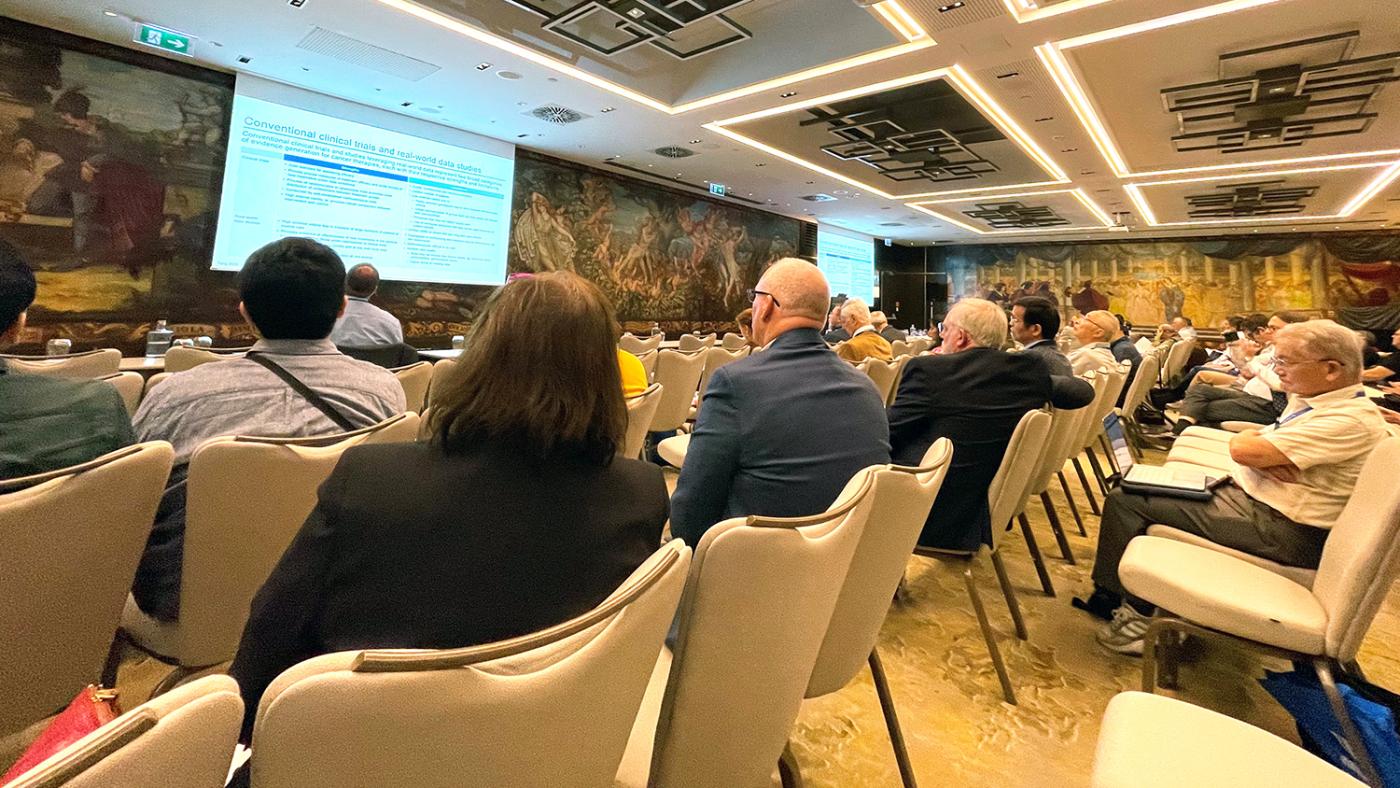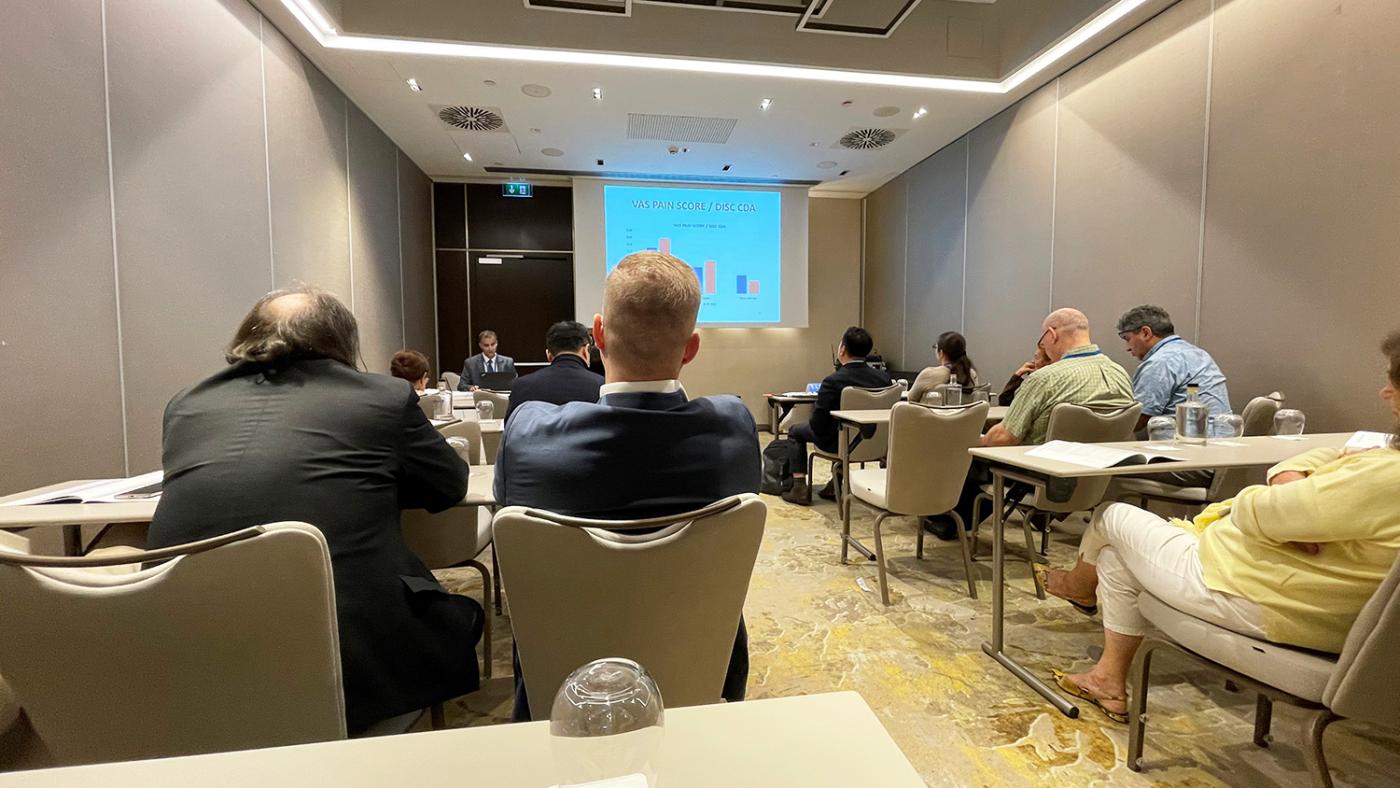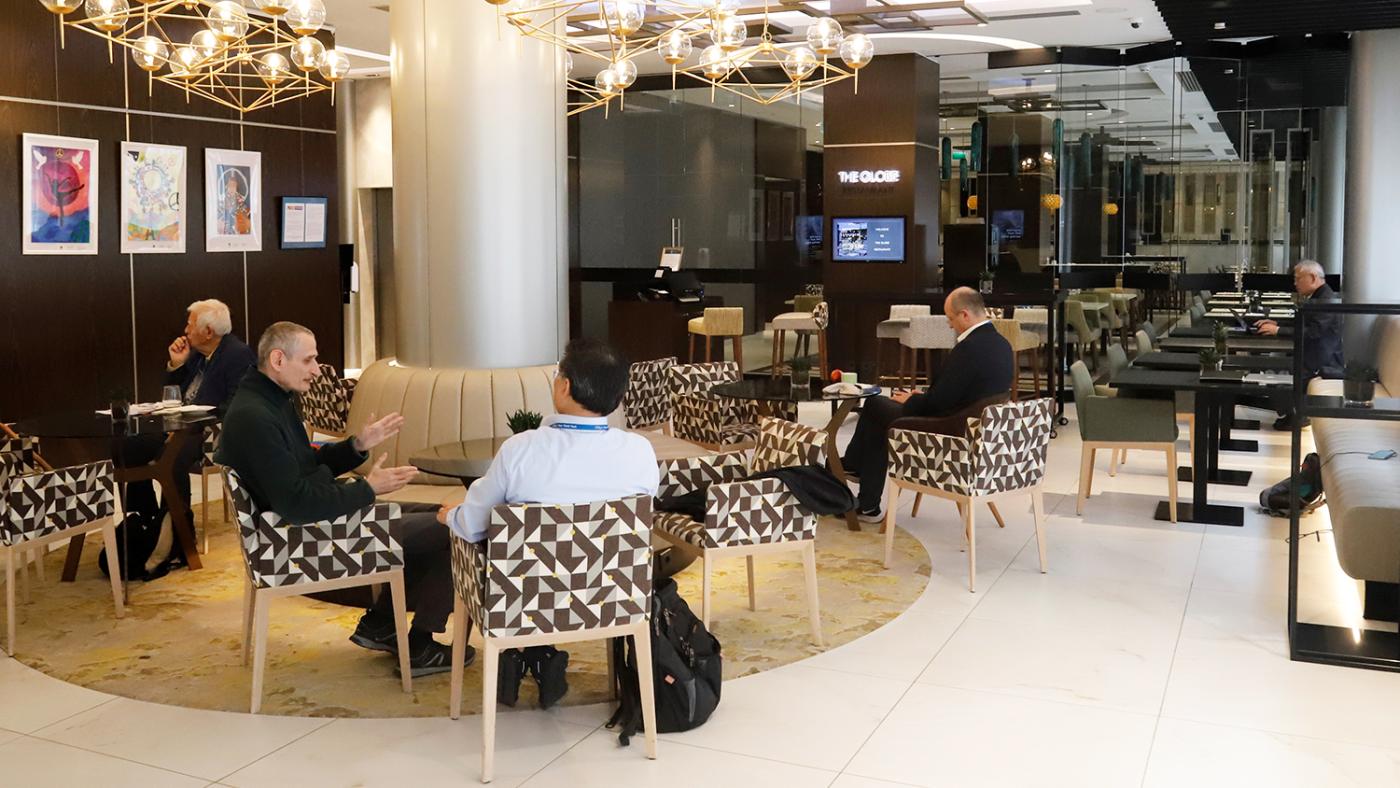Predatory conferences
Rogue companies rip off scientists through fake conferences

"At least you can say you watched a weird presentation about mobile phone use on buses.” Researcher Rand Raheem, from the University of Middlesex, in England, laughs away her discomfort as she concludes her presentation. She has just spent twenty minutes talking about unstable Internet reception in fast modes of transport such as trains and buses, and technical solutions for this problem.
The topic would not be a bad fit for an academic conference, except that Raheem is speaking at NeuroTalk Budapest, a conference about neuroscience. She is not the only odd one out: her lecture is followed by another one on the role of osteoporosis in dental procedures. Even the presentations that do touch on neuroscience are not related to each other. They range from how parentheses are important for understanding sentences to the electrical stimulation of spinal nerves to promote intervertebral disc repair.
Lectures in academic conferences are usually aligned in terms of content. After all, conferences are meant to be an occasion for academics from a certain field to meet each other, catch up, and learn more about their area of expertise. They are a place to network, put your research in the spotlight, and get new research ideas.
So, what is going on here in Budapest? Neurotalk 2024 Europe is a predatory conference. It's the academic equivalent of buying fake Nikes without realising it. They may look real from a distance, but a close inspection reveals they are a substandard copycat.
This isn't a new practice. Science is also plagued by predatory journals, scientific publications primarily intended as cash cows for the companies that publish them. Anyone can publish an article in these publications, as long as they pay hundreds or even thousands of euros. However, these journals are not peer-reviewed, which means their scientific value is zero. They are just a way for publishers to make money and scientists to pimp their CVs (deliberately or not).
Fake conferences – often backed by the same companies – operate similarly. Anyone can participate in them, as long as they pay the registration fee, which is usually pretty high. The result is a substantively incoherent hodgepodge. Since universities often pay for the costs of participating in conferences, this means taxpayers' money is being wasted, even though the organiser is the only one who benefits from the event.
Shady company
Let's take a closer look at this form of money-making. NeuroTalk, held last summer in a chic hotel in Budapest, offers a great opportunity to do so, as several Dutch scientists are on the programme. What brings them here? Are they aware this is a fake event? Press accreditation wasn't available, but news agency HOP managed to report on the conference anyway by booking a room in the same hotel.
NeuroTalk, a three-day event whose latest edition was held at the Radisson Blu Beke Hotel, is organised by BITcongress, a rather shady company from China which often appears on lists of suspicious conference organisers. BIT is based in Dalian and claims to organise conferences in Europe, Japan and China.
Participants are recruited through flattering invitations which praise them for their "remarkable research" and most researchers who respond to them do not realise they are being misled. Scientists receive dozens of these emails every month. They usually end up in the spam folder (the reporter, a former scientist himself, also received an invitation to go to Budapest). The flattering nature of the emails is the reason why these events have been nicknamed "vanity conferences".
Alexander Minnaert, from the University of Groningen, is one of the researchers who reacted to NeuroTalk's email. HOP met him at NeuroTalk's last morning session, in the hotel's Britannia II room. The professor of Orthopedagogics had just given an inspired presentation on how deaf-blind children can learn to communicate. “I was supposed to attend an earlier edition of this event in Singapore, but it got cancelled because of Covid. I could not get my registration fee back, so I came to Budapest instead."
He says the costs – 1,650 to 3,050 dollars per person, according to BITcongress' website – were paid by his university. Minnaert is combining the conference with visits to colleagues in the region with whom he is working on a research project. He acknowledges the quality of many presentations is substandard. “I was going to chair a session, so I made a few suggestions on how to make it more coherent, but unfortunately they didn't do much about that.” He also admits the talks are sometimes difficult to follow. “They go in many directions. The conference opening was sad, really.”

Scam
However, at first glance, it is hard to spot NeuroTalk as a scam. After all, it features real scientists giving real presentations and they all registered voluntarily. The logistics and catering are pretty professional: the participants are pampered with free lunches and drinks. Besides, every researcher knows that some legit conferences are not always strong in terms of content.
If you look more closely and talk to visitors on-site, though, you'll soon realise that something isn't right. Some of the conference's characteristics match recent reports about fake conferences published by Nature (twice) and Science, as well as by universities's websites and even websites of companies that make conference software.
For example, some researchers are mentioned on the programme without their knowledge. Anesthesiologist-in-training Marije Wijnberge, from Amsterdam AMC, is one of them. “I am definitely not speaking at this event,” she tells HOP when asked about her presence in Budapest. “I may have asked them a few questions about the event, that's all. How ludicrous that they put my name in the programme as a speaker.”
This is not a mistake by the organisation, but rather a deliberate strategy. If you reply to their invitation in any way, you run the risk of seeing your name in a provisional programme, which is used as bait for other scientists.
A second suspicious sign is the fact that their website does not contain any summaries of the presentations the scientists are going to give. Legitimate conferences always do so as these summaries are the main tools for determining which lectures to attend. In addition, the organisers are not a professional association but rather a vague company from China, and anyone who pays the fee can present at the conference.
A final red flag is that these companies cleverly "combine" conferences. In addition to NeuroTalk, eight other conferences were taking place simultaneously in the rooms of the Radisson Blue Beke Hotel, all organised by BITcongress. They ranged from cardiology to dentistry and had bombastic names such as Annual World Cancer Congress and Annual World Congress of Smart Materials.

No top performers
Even so, pedagogue Minnaert does not think the meeting in Budapest is a scam. “Everyone always says there needs to be more cross-pollination between scientific disciplines. That is what is happening here. Personally, I think broadening to medicine is interesting and I made a few new contacts. After my presentation, someone asked if I was coming to the afternoon session because he wanted to talk to me a bit more.”
His colleague Behrooz Alizadeh, an epidemiologist at the University Medical Centre in Groningen (UMCG), is less impressed. “If the interdisciplinary character had been worked out professionally, this could have been pretty interesting, but that is not the case at all,” he says. Like many other participants, he is not very enthusiastic about the event's scientific level either. “Many speakers here are not top performers in their field, not even the keynote speakers. They are just doing this to add something to their CV, which is dubious.”
Asked why he was there, he says: “I wanted to try it out.” HOP asked him the same question by email before the event, and he replied rather defensively, saying "It is a legal conference". But now that he is talking to the HOP journalist in person, he seems more open. “This is not a conference I would normally go to, but the organisation paid for my registration costs and a night at the hotel.”
One of his main reasons for accepting the invitation email was that he was initially supposed to speak in the overarching keynote forum, which all 400 visitors would attend. But those plans ultimately fell through. “I am disappointed about that, that's not what we had agreed."
In addition to the two Groningen residents, a handful of Dutch people are on the programme too. Aside from Wijnberge from Amsterdam (who is not present), Parkinson's researcher Ciska Heida, from the University of Twente (UT), is mentioned. She explains after her lecture that NeuroTalk's broad programme appealed to her. “Well-known conferences often invite usual suspects to speak.”
Her professional-looking presentation, which covered recent research into how virtual reality and special vibrating socks can help Parkinson's patients walk better, is in stark contrast to the quality of many other presentations, which are hardly state-of-the-art, discussing scientific studies from five years or more ago.

Paid out of own pocket
It is not surprising that some participants feel downright cheated, such as Marisol Hernández, from the University of Chile. “I went because I was invited and there were supposed to be interesting talks about leadership and health. But the topics are too different from each other. At other conferences, you make new connections, which are useful for your academic development. This conference is of no use to me at all. I feel cheated.” The visit cost her thousands of euros – an even greater expense for the less affluent Chileans than for many Western researchers.
Dutch scientists also appear to have been financially duped. “I just fell for it. Now I have lost 1,000 euros,” says Niels, a postdoctoral researcher from Utrecht University who prefers not to be named. Talking to HOP on the phone before the conference, Niels says he registered for NeuroTalk because their website stated there would be speakers from the industry and Niels wants to transition from fundamental to more applied research. “I hoped to talk to people who were further along in this process.” He did not know the conference, but the fact that researchers from Groningen were on the programme made him trust it.
He was pressured to decide quickly, so he wouldn't lose a registration discount – another well-known tactic. “Only after I had paid more than 1,000 euros did I investigate the conference organisation. That's when I discovered there were several warnings about them online.” But it was too late. “I wanted to cancel, but I could only get part of my money back.”
Niels is paying the 1,000 euros out of his own pockets because his department did not want to pay for his registration. “I feel so stupid, but I hope my experience will warn others about this kind of abuse.”
However, the BITcongress delegates in Budapest are not aware of any wrongdoing. Mr. Liu is one of a handful of Chinese employees managing the logistics on-site. When asked, he confirms that scientists are invited by email and anyone who responds positively and pays the registration fee is allowed to speak. But he tells it as if this was perfectly normal.
According to Liu, the conference reflects the company's goals. “My boss is a doctor and entrepreneur who started these conferences to bring scientists and business professionals together." It is difficult to determine how much money BIT makes from it, but based on the registration fee alone, turnover should quickly approach one million euros. The hotel states their fees are confidential.
BITcongress is not amused when they get my email questioning them about the criticism. “Are you kidding?”, replies Anna Li on behalf of the organisation. “We simply incur high costs. We have been organising these conferences for ten years and have invited almost 100 Nobel Prize winners. Speakers appreciate us very much.”
None of the visitors HOP met in Budapest plans to attend the next edition of the event, which will happen in Dublin and Stockholm, according to the booklet. “This was once, but never again,” says UT researcher Heida. “If I had known this in advance, I would not have come here.” The same applies to Alizadeh from UMCG. “But it was good to experience it this once. It raises awareness.”
For BITcongress, it probably doesn’t matter much. The company has already secured the loot and it can use the group photos and visitors' names as a billboard for future editions. This way, the system is maintained and other scientists will be interested. There are enough scientists in the world to approach after all.
HOP's reporter also quickly receives another email, inviting him to speak at NeuroTalk Dublin. Those who register now receive a whopping 50 percent discount and only pay 750 dollars. He then sends a proposal for a nonsense presentation about the influence of aliens on our brain activity. It is accepted without any problems. The registration fee appears to be negotiable, though. “How much can you come for?”
There are more fake conferences than real ones
How big is this counterfeit business? There aren't many figures available on that. British researcher Andy Nobes concluded a few years ago that there are probably more fake conferences than regular ones. OMICS, a major player from India which is also infamous for publishing all kinds of fake scientific journals, organises around 3,000 conferences each year. Another well-known organisation is the World Academy of Science, Engineering and Technology (WASET).
In 2016, OMICS was sued by the American Federal Trade Commission because of the misleading nature of its conferences and magazines. A judge eventually sentenced the Indian company to a more than 50-million-dollar fine. OMICS vehemently denied any wrongdoing and filed a counterclaim of 3 billion euros.
This publication was sponsored by VWN Tripfonds. An extended version will be published next year in a book about scientific integrity by the same author ("Te mooi om waar te zijn", Lebowski).